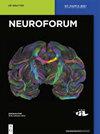肠神经系统:“肠道里有一个小大脑”
Q3 Medicine
引用次数: 8
摘要
摘要肠道自身的自主神经系统,即肠神经系统(ENS),100多年来一直吸引着科学家。它通过执行复杂的任务和独立于外部输入控制重要功能,在真正意义上自主发挥作用。与此同时,ENS受到来自肠壁和管腔中其他细胞的信号的轰击,必须整合所有这些输入。我们描述了ENS在生理条件下的主要功能,并举例说明其在肠道疾病中的作用。近年来,随着神经胃肠病学领域外的科学家意识到ENS在帕金森氏症、自闭症和多发性硬化症发病机制中的重要作用,ENS受到了越来越多的关注。本文章由计算机程序翻译,如有差异,请以英文原文为准。
The enteric nervous system: “A little brain in the gut”
Abstract The gut’s own autonomous nervous system, the enteric nervous system (ENS), has fascinated scientists for more than 100 years. It functions, in the true sense of the word, autonomously, by performing complex tasks and controlling vital functions independently of extrinsic inputs. At the same time, the ENS is bombarded with signals from other cells in the gut wall and lumen and has to integrate all of these inputs. We describe the main functions of the ENS under physiological conditions and give a few examples of its role in gut diseases. The ENS has received increasing attention recently as scientists outside the field of Neurogastroenterology realize its important role in the pathogenesis of Parkinson’s, autism and multiple sclerosis.
求助全文
通过发布文献求助,成功后即可免费获取论文全文。
去求助
来源期刊

Neuroforum
NEUROSCIENCES-
CiteScore
1.70
自引率
0.00%
发文量
30
期刊介绍:
Neuroforum publishes invited review articles from all areas in neuroscience. Readership includes besides basic and medical neuroscientists also journalists, practicing physicians, school teachers and students. Neuroforum reports on all topics in neuroscience – from molecules to the neuronal networks, from synapses to bioethics.
 求助内容:
求助内容: 应助结果提醒方式:
应助结果提醒方式:


